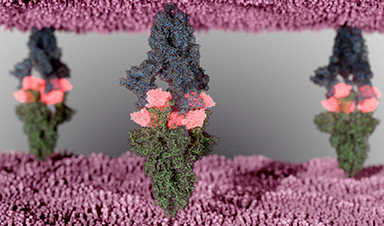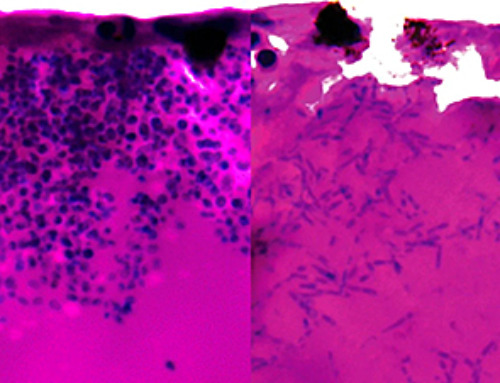Researchers at Karolinska Institutet in Sweden have developed a novel strategy for identifying potent miniature antibodies, so-called nanobodies, against emerging SARS-CoV-2 variants. The approach led to the discovery of multiple nanobodies that in cell cultures and mice effectively blocked infection with different SARS-CoV-2 variants. The findings, which are described in the journals Nature Communications and Science Advances, could pave the way for new treatments against COVID-19.
Despite the roll-out of vaccines and antivirals, the need for effective therapeutics against severe COVID-19 infection remains high. Nanobodies—which are fragments of antibodies that occur naturally in camelids and can be adapted for humans—are promising therapeutic candidates as they offer several advantages over conventional antibodies. For example, they have favorable biochemical properties and are easy to produce cost-effectively at scale.
In the now published studies, the labs of Gerald McInerney and Ben Murrell, also at MTC, identify several potent nanobodies derived from an alpaca immunized with SARS-CoV-2 antigens.
The first report in Nature Communications describes a single nanobody, Fu2 (named after the alpaca Funny), that significantly reduced the viral load of SARS-CoV-2 in cell cultures and mice. Using electron cryo-microscopy, the researchers found that Fu2 naturally binds to two separate sites on the viral spike, thus inhibiting the virus’ ability to enter the host cell. This part of the study was conducted in collaboration with Hrishikesh Das and Martin Hällberg at the Department of Cell and Molecular Biology at Karolinska Institutet.
The researchers next delved deeper into the alpaca’s nanobody repertoire by combining a range of advanced laboratory techniques and computational methods, resulting in a library of nanobodies described in detail.
The results, presented in Science Advances, revealed additional nanobodies that in cell cultures and mice effectively cross-neutralized both the founder and beta variant of SARS-CoV-2 and even neutralized the more distantly related SARS-CoV-1.
“These nanobodies represent promising therapeutic candidates against several SARS-CoV-2 variants,” says first author Leo Hanke, a postdoctoral researcher who established the nanobody technology in the McInerney group.
The researchers are currently applying the same techniques to identify which nanobodies from this set are best able to neutralize omicron, the now dominating SARS-CoV-2 variant.
“Once established, these libraries can be expanded and mined for nanobodies that neutralize new emerging variants,” says Assistant Professor Ben Murrell, also joint senior author of both studies.
News
Scientists Unlock a New Way to Hear the Brain’s Hidden Language
Scientists can finally hear the brain’s quietest messages—unlocking the hidden code behind how neurons think, decide, and remember. Scientists have created a new protein that can capture the incoming chemical signals received by brain [...]
Does being infected or vaccinated first influence COVID-19 immunity?
A new study analyzing the immune response to COVID-19 in a Catalan cohort of health workers sheds light on an important question: does it matter whether a person was first infected or first vaccinated? [...]
We May Never Know if AI Is Conscious, Says Cambridge Philosopher
As claims about conscious AI grow louder, a Cambridge philosopher argues that we lack the evidence to know whether machines can truly be conscious, let alone morally significant. A philosopher at the University of [...]
AI Helped Scientists Stop a Virus With One Tiny Change
Using AI, researchers identified one tiny molecular interaction that viruses need to infect cells. Disrupting it stopped the virus before infection could begin. Washington State University scientists have uncovered a method to interfere with a key [...]
Deadly Hospital Fungus May Finally Have a Weakness
A deadly, drug-resistant hospital fungus may finally have a weakness—and scientists think they’ve found it. Researchers have identified a genetic process that could open the door to new treatments for a dangerous fungal infection [...]
Fever-Proof Bird Flu Variant Could Fuel the Next Pandemic
Bird flu viruses present a significant risk to humans because they can continue replicating at temperatures higher than a typical fever. Fever is one of the body’s main tools for slowing or stopping viral [...]
What could the future of nanoscience look like?
Society has a lot to thank for nanoscience. From improved health monitoring to reducing the size of electronics, scientists’ ability to delve deeper and better understand chemistry at the nanoscale has opened up numerous [...]
Scientists Melt Cancer’s Hidden “Power Hubs” and Stop Tumor Growth
Researchers discovered that in a rare kidney cancer, RNA builds droplet-like hubs that act as growth control centers inside tumor cells. By engineering a molecular switch to dissolve these hubs, they were able to halt cancer [...]
Platelet-inspired nanoparticles could improve treatment of inflammatory diseases
Scientists have developed platelet-inspired nanoparticles that deliver anti-inflammatory drugs directly to brain-computer interface implants, doubling their effectiveness. Scientists have found a way to improve the performance of brain-computer interface (BCI) electrodes by delivering anti-inflammatory drugs directly [...]
After 150 years, a new chapter in cancer therapy is finally beginning
For decades, researchers have been looking for ways to destroy cancer cells in a targeted manner without further weakening the body. But for many patients whose immune system is severely impaired by chemotherapy or radiation, [...]
Older chemical libraries show promise for fighting resistant strains of COVID-19 virus
SARS‑CoV‑2, the virus that causes COVID-19, continues to mutate, with some newer strains becoming less responsive to current antiviral treatments like Paxlovid. Now, University of California San Diego scientists and an international team of [...]
Lower doses of immunotherapy for skin cancer give better results, study suggests
According to a new study, lower doses of approved immunotherapy for malignant melanoma can give better results against tumors, while reducing side effects. This is reported by researchers at Karolinska Institutet in the Journal of the National [...]
Researchers highlight five pathways through which microplastics can harm the brain
Microplastics could be fueling neurodegenerative diseases like Alzheimer's and Parkinson's, with a new study highlighting five ways microplastics can trigger inflammation and damage in the brain. More than 57 million people live with dementia, [...]
Tiny Metal Nanodots Obliterate Cancer Cells While Largely Sparing Healthy Tissue
Scientists have developed tiny metal-oxide particles that push cancer cells past their stress limits while sparing healthy tissue. An international team led by RMIT University has developed tiny particles called nanodots, crafted from a metallic compound, [...]
Gold Nanoclusters Could Supercharge Quantum Computers
Researchers found that gold “super atoms” can behave like the atoms in top-tier quantum systems—only far easier to scale. These tiny clusters can be customized at the molecular level, offering a powerful, tunable foundation [...]
A single shot of HPV vaccine may be enough to fight cervical cancer, study finds
WASHINGTON -- A single HPV vaccination appears just as effective as two doses at preventing the viral infection that causes cervical cancer, researchers reported Wednesday. HPV, or human papillomavirus, is very common and spread [...]





















